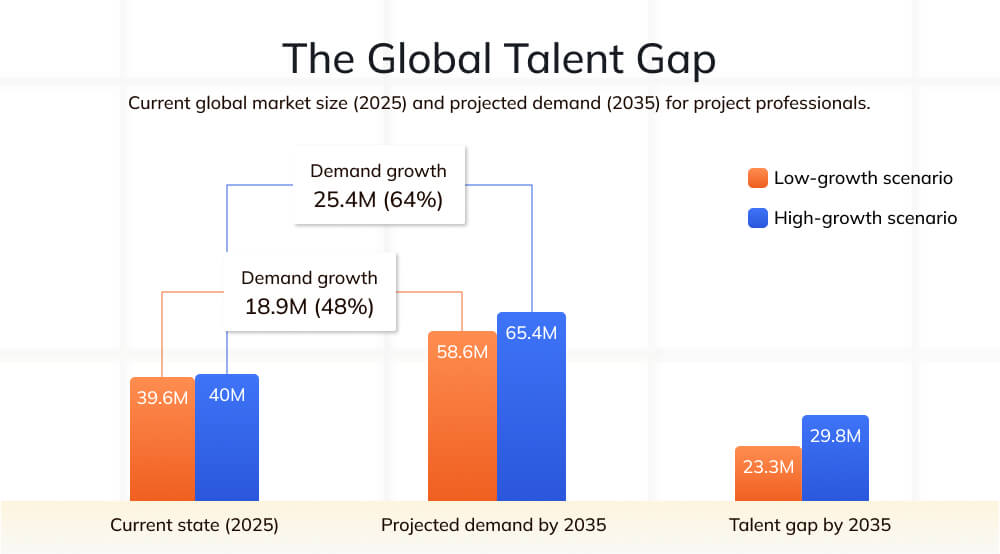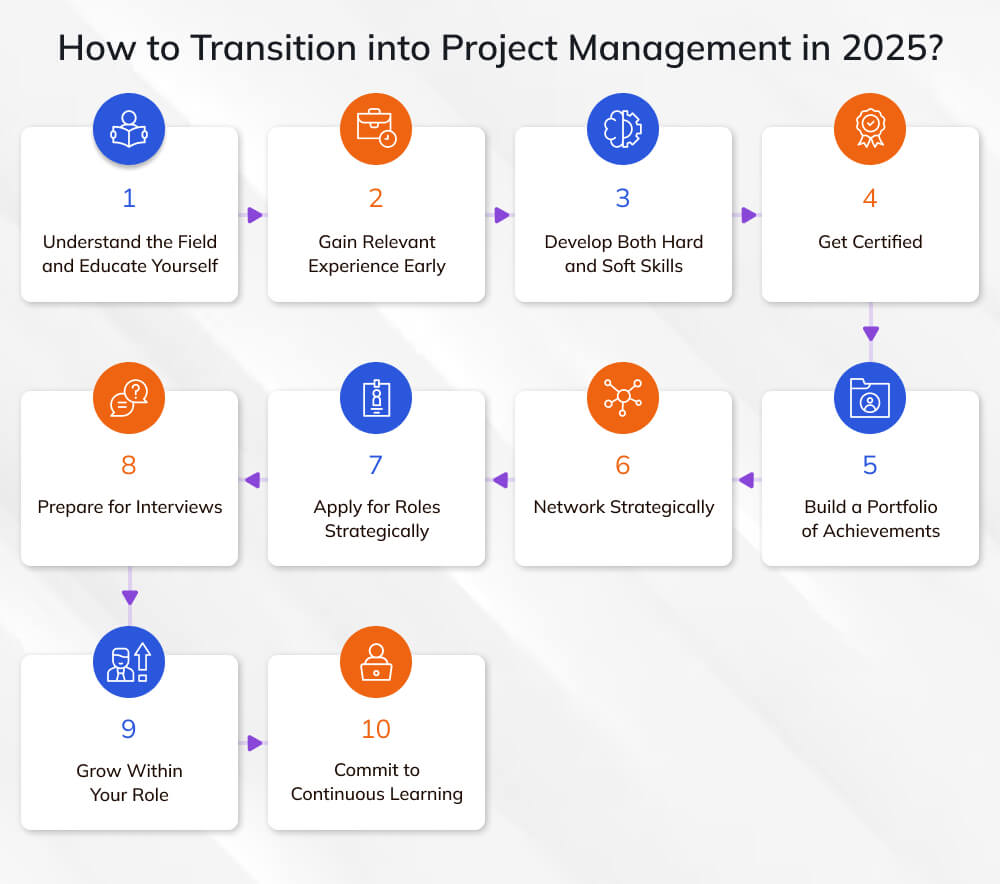
In 2026, businesses are witnessing a lot of changes. For instance, companies are undertaking more complex projects, adapting to AI-driven workflows, industries, and international markets. According to industry experts, without skilled project managers, even the best ideas can be delayed, go over budget, or fail to deliver. They’re the ones who keep teams aligned, solve problems as they arise, and ensure projects actually succeed.
Consequently, the demand for skilled project professionals is on the rise. In fact, by 2035, the world will need nearly 30 million more project managers to meet the growing business needs in various sectors, including healthcare, construction, and IT.
Yet, a significant skills gap exists, which means there’s a real opportunity for professionals to upskill and advance their careers. For many, this raises natural questions: Am I ready to take on a leadership role? How can I acquire the necessary skills? Can I make the shift without starting over?.
The good news is that moving into project management doesn’t mean starting from scratch. By building on your existing experience and learning targeted project management tools, you can confidently bridge the skills gap.
Table of Contents:
- 5 Reasons to Choose Project Management in 2026
- How to Transition into Project Management in 2026?
- Overcoming Common Challenges in a Project Management Career Change
- Resources and Tools for Aspiring Project Managers
- Case Study: From Analyst to Project Manager – Ghia Yuson’s Career Transformation
- Conclusion
- Frequently Asked Questions
In this article, we’ll discuss a clear and practical strategy to help you confidently bridge the skills gap and transition into project management in 2026.
5 Reasons to Choose Project Management in 2026
If you’re considering a move into project management, here are five compelling reasons why 2026 could be the right time to make the shift:
1. Strong Demand Across Industries
Industry experts estimate that around 70% of IT, technology, and digital projects fail. One of the main reasons? Poor planning, coordination, and execution. That’s where the rising demands of project managers come in. Skilled professionals are needed across various sectors, including tech, healthcare, construction, and energy, to organize teams, manage resources, and ensure projects are completed on time and deliver value. Hence, choosing project management as a career is a good decision in 2026.
2. Lucrative Salaries and Job Security
Project management isn’t just in demand. It also pays well. Experienced project managers can earn between $90,000 and $120,000 a year globally, and certified professionals in the PMP have a 33% higher median salary. On top of that, because organizations in nearly every industry rely on projects to grow and stay competitive, these roles offer strong job security and plenty of career opportunities.
3. Leadership Opportunities and Career Growth
Project managers aren’t just organizers; they’re leaders. They get to guide teams, make important decisions, and shape how projects succeed. Because every project touches different departments and sometimes even different countries, this role naturally opens doors to higher responsibilities, promotions, and the chance to build a strong career path across industries.
4. Technology Integration and Modern Workflows
Today’s projects rely heavily on technology, from AI tools and cloud platforms to digital collaboration software. Project managers are the ones who make sure these tools actually work for the team, streamline workflows, and keep projects on track. If you enjoy working with technology and improving how teams get things done, this role puts you right at the center of it all.
5. Global and Cross-Industry Opportunities
Project management skills are transferable across industries and countries. Whether it’s tech in Silicon Valley, healthcare in Europe, or construction in Asia, skilled project managers can find opportunities almost anywhere. This flexibility allows you to explore various sectors, work internationally, and take on projects that have a tangible impact.
How to Transition into Project Management in 2026?
Jumping into project management without a clear plan can be risky. Simply trying things randomly or relying on “learning as you go” might leave you struggling with the wrong skills, missing key certifications, or taking roles that don’t align with your career goals. Here’s a detailed strategy for transitioning into project management:
1. Understand the Field and Educate Yourself
First things first, before diving in, take time to understand what project management really involves. In fact, try exploring different methodologies, including Agile, Scrum, Waterfall, and hybrid approaches. After that, enroll in foundational courses like the Project Management Fundamentals course to learn about project lifecycles, risk management, team coordination, and workflow optimization. For instance, if you work in the construction industry, make sure to find out which certification is right for you.
2. Gain Relevant Experience Early
Theory alone won’t make you a project manager. The sooner you start getting hands-on experience, whether in your current role, entry-level positions, internships, or volunteer projects, the better you’ll understand how to manage scope, timelines, and stakeholders in real situations.
- Within Your Current Role: Look for ways to lead initiatives, coordinate tasks, or manage small projects. Even informal project responsibilities count.
- Entry-Level Positions: Roles like project coordinator, assistant project manager, or project analyst provide exposure to real-world project challenges.
- Internships and Volunteer Work: These offer a low-risk environment to practice, make mistakes, and learn without high stakes.
3. Develop Both Hard and Soft Skills
Project management isn’t just about processes and tools; it’s also about people. Developing leadership, communication, problem-solving, and time-management skills will allow you to guide teams, handle challenges gracefully, and keep projects moving forward efficiently.
- Leadership & People Skills: Guiding teams, resolving conflicts, motivating members, and making decisions under pressure.
- Communication: Articulating goals clearly, presenting updates, and maintaining transparency with stakeholders.
- Time & Resource Management: Prioritizing tasks, allocating resources effectively, and keeping projects on schedule.
- Problem-Solving & Critical Thinking: Anticipating risks, adapting to change, and finding practical solutions.
4. Get Certified
Certifications are powerful tools to validate your skills:
- PMP® (Project Management Professional): PMP is globally recognized and highly valued.
- CAPM® (Certified Associate in Project Management): CAPM is great for beginners entering the field.
- PRINCE2®: PRINCE2 is widely used in certain industries and regions.
| Insight: Certified professionals often see higher salaries, faster promotions, and access to international opportunities. |
5. Build a Portfolio of Achievements
Document the projects you’ve managed, both successes and challenges. Highlight measurable results, strategies you implemented, and lessons learned. A well-curated portfolio shows hiring managers your ability to deliver real outcomes and think strategically.
How to Build Your Portfolio:
Collect Your Work
Save documents like project plans, reports, or dashboards. If the information is sensitive, you can always remove the details but keep the structure intact. What matters is showing how you approach projects.
Show Results in Numbers
Hiring managers love to see impact. Did you finish a project ahead of schedule? Save costs? Improve team efficiency? Write it down. For example: “Cut onboarding time by 20% within three months by introducing a new training workflow.”
Highlight Tools You’ve Used
Whether it’s Jira, Trello, Asana, or MS Project, show how you’ve used these tools in real situations. It makes your experience feel tangible and relevant.
Be Honest About Challenges
Don’t just showcase the wins. Share moments where things didn’t go as planned and what you did to fix them. That reflection shows maturity and problem-solving ?skills.
Present It Professionally
Organize your portfolio into sections like “Project Highlights,” “Key Learnings,” and “Tools & Methods.” You can keep it as a PDF, build a simple website, or even showcase projects on LinkedIn.
6. Network Strategically
Project management is as much about connections as it is about skills. Joining professional communities, attending events, and seeking mentorship can expose you to valuable insights, job opportunities, and practical advice that textbooks and courses alone can’t provide.
- Join professional associations, online forums, and local meetups.
- Seek mentorship from experienced project managers who can offer guidance, insights, and sometimes even job opportunities.
| Insight: Many project management roles are filled through referrals and professional connections, making networking a critical part of your career strategy. |
7. Apply for Roles Strategically
Start with positions that match your experience: project coordinator, assistant project manager, or Agile PM roles. Tailor your project manager resume and cover letter to highlight relevant skills, certifications, and project experiences. Focus on what you can contribute to the team immediately, while showing growth potential.
8. Prepare for Interviews
Interviews for project management positions often test both knowledge and applied skills:
- Be ready to explain how you managed timelines, handled conflicts, or overcame challenges.
- Share real-world examples that demonstrate leadership, decision-making, and problem-solving capabilities.
- Familiarize yourself with scenario-based questions common in Agile and hybrid project environments.
9. Grow Within Your Role
Once you land your first role, treat it as a launchpad. Take initiative, learn continuously from colleagues and feedback, and gradually take on more complex projects. Advanced certifications like PgMP or PMI-ACP can help accelerate your career growth.
- Take ownership of small projects and demonstrate reliability.
- Continuously seek feedback and learn from experienced colleagues.
- Consider advanced certifications, such as PgMP (Program Management Professional) or PMI-ACP (Agile Certified Practitioner), as your career progresses.
10. Commit to Continuous Learning
Project management is a dynamic field. With new tools, methodologies, and global business trends emerging constantly, ongoing learning is crucial. Attend workshops, read industry reports, participate in webinars, and continually adapt your skills to meet the evolving needs of business environments. But if you want a more structured path, this is where our project management courses come in. They’re designed to help you not just understand frameworks like Agile, PRINCE2®, or PMP®, but also apply them in real projects.
| Insight: Project managers who combine technical expertise with leadership and adaptability not only succeed in their roles but also have the opportunity to lead large-scale, high-impact initiatives across industries. |
Overcoming Common Challenges in a Project Management Career Change
| Challenge / Problem | Solution |
| Lack of Formal Project Management Experience | Take on project-like tasks in your current role, such as coordinating team initiatives or leading small cross-functional efforts. Document these experiences and quantify results to demonstrate transferable skills to future employers. |
| Difficulty Understanding Multiple Methodologies | Start with one methodology like Agile or Waterfall, then gradually explore hybrid and niche approaches. Use simulation tools, case studies, or mini-projects to see theory in action. Create a flowchart to map how different methodologies apply to various project scenarios. |
| Limited Exposure to Stakeholder Management | Volunteer to liaise between teams, clients, or departments to build cross-functional experience. Develop active listening, negotiation, and conflict resolution skills by joining role-playing workshops or seeking guidance through mentorship programs. Practice tracking decisions and communications systematically using tools like RACI charts for stakeholder mapping, Kanban boards (Trello/Jira) to manage tasks, or meeting minutes templates to capture key takeaways. These methods give you hands-on exposure to how real project managers keep projects aligned and stakeholders engaged. |
| Overcoming Technical Knowledge Gaps | Identify tools used in your target industry (e.g., Jira, MS Project, Smartsheet) and pursue short courses or certifications. Combine this with hands-on practice in mock projects to bridge the gap between theory and application. |
| Building Credibility Without a Certification | Begin with entry-level certifications like CAPM®, then progress to PMP. Complement with a portfolio of small projects showing tangible results, emphasizing problem-solving and leadership to establish credibility. |
| Fear of Managing Complex Projects Early | Start with small-scale or internal projects. Use flowcharts and project plans to visualize tasks, dependencies, and risks before execution. Gradually take on larger responsibilities as confidence and competence grow. |
| Networking Challenges in a New Field | Join industry-specific online forums, LinkedIn groups, and local PM associations. Attend workshops or webinars and actively engage in discussions. Find mentors who can provide practical advice and referrals. |
| Difficulty Quantifying Skills and Achievements | Keep a track record of projects using measurable outcomes (budget saved, timelines met, efficiency. |
Resources and Tools for Aspiring Project Managers
Stepping into project management is easier when you know where to find the right resources and tools. Online learning platforms provide certification preparation for globally recognized credentials like PMP, CAPM, and PRINCE2 Foundation and Practitioner.
Project management software is another essential area to explore. Tools like Asana, Trello, Jira, and Microsoft Project help you understand task tracking, team collaboration, and workflow automation, all practical skills you can immediately apply in real-world projects.
Professional communities and networks are invaluable for learning from experienced managers. PMI chapters, project management forums, and LinkedIn groups provide opportunities to ask questions, share experiences, and seek mentorship. Participating in webinars, virtual meetups, and discussion groups also keeps you updated on emerging trends and best practices.
Ultimately, books, blogs, and podcasts by experienced project managers offer both theoretical foundations and practical insights into the nuances of the role. Resources like “The Project Management Institute Blog”, Harvard Business Review articles on project leadership, and podcasts such as “Projectified” offer perspectives that help bridge the gap between formal learning and day-to-day project challenges.
With these tools and resources, aspiring project managers can not only build knowledge but also practice applying it, giving them confidence as they step into this growing field.
Case Study: From Analyst to Project Manager – Ghia Yuson’s Career Transformation
| Ghia Yuson’s career path demonstrates how diverse experiences can lead to a successful project management career. With a degree in Industrial Economics, she began as an equity research analyst, spending six years analyzing markets and working with data.
While stimulating, she sought more variety and impact, which led her to corporate strategy, where she formally began managing projects, coordinating teams, planning initiatives, and navigating complex challenges. Her transition into management consulting gave her the official title of Project Manager, exposing her to a wide range of projects from market research to operational setups. To solidify her expertise, Ghia took a 7-month sabbatical to pursue the PMP® certification, which validated her skills and opened doors to larger projects. Today, she applies her project management knowledge in supply chain excellence, overseeing a diverse range of projects across various industries. Key Takeaways:
Ghia’s journey shows that with the right focus, anyone can transition successfully into project management. |
Conclusion
To sum up, jumping into project management might feel intimidating at first, but the career path into project management is absolutely worth it. With the right skills, real-world experience, and industry-recognized certifications, you can unlock incredible project management career benefits from higher earning potential to leadership opportunities across industries.
If you’ve ever wondered why to become a project manager, the answer is clear: demand is booming, and project management jobs in 2026 are expected to be among the fastest-growing roles worldwide. Whether you’re exploring a new direction, seeking a transition guide to shift careers, or simply curious about becoming a project manager, the key is preparation.
That’s where Invensis Learning can help. Our expert-led courses simplify the journey toward certifications like PMP, CAPM, and PRINCE2, giving you the confidence to excel. So, put in the effort, keep building your skills, and step confidently into a rewarding career in project management.
| Ready to take the leap?
Don’t wait, start building your project management skills today! Check out Invensis Learning for courses and certifications that can kickstart your journey. Your future as a skilled project manager starts now! |
Frequently Asked Questions
1. Do I Need a Technical Background To Succeed in Project Management?
Not at all. While some roles benefit from technical knowledge, project management is mostly about planning, organizing, and leading teams. Your transferable skills, communication, problem-solving, and leadership matter far more than your degree.
2. How Do I Get Real Project Experience if I’m Switching Careers?
You don’t need a fancy title to start. Volunteer to manage small initiatives at work, in community projects, or even personal ventures. The key is to document what you did and the results; it shows you can deliver.
3. Which Certification Is Truly Worth It for 2026?
PMP® is still the gold standard if you have some experience. For beginners, CAPM® is perfect. PRINCE2® is useful in certain regions or industries. Think of certification as proof that you know the rules and can apply them, not just a piece of paper.
4. How Long Does It Take To Transition Fully Into a Project Management Role?
It depends on your experience and effort. Some make the switch in 6–12 months by combining courses, hands-on projects, and networking. The faster you apply what you learn, the faster you gain credibility.
5. Can Project Management Really Be a Long-Term Career?
Absolutely. Project management skills are highly transferable across industries, from IT and healthcare to construction and supply chain. With continuous learning, certifications, and leadership growth, you can scale into program management, portfolio management, or executive roles over time.



















